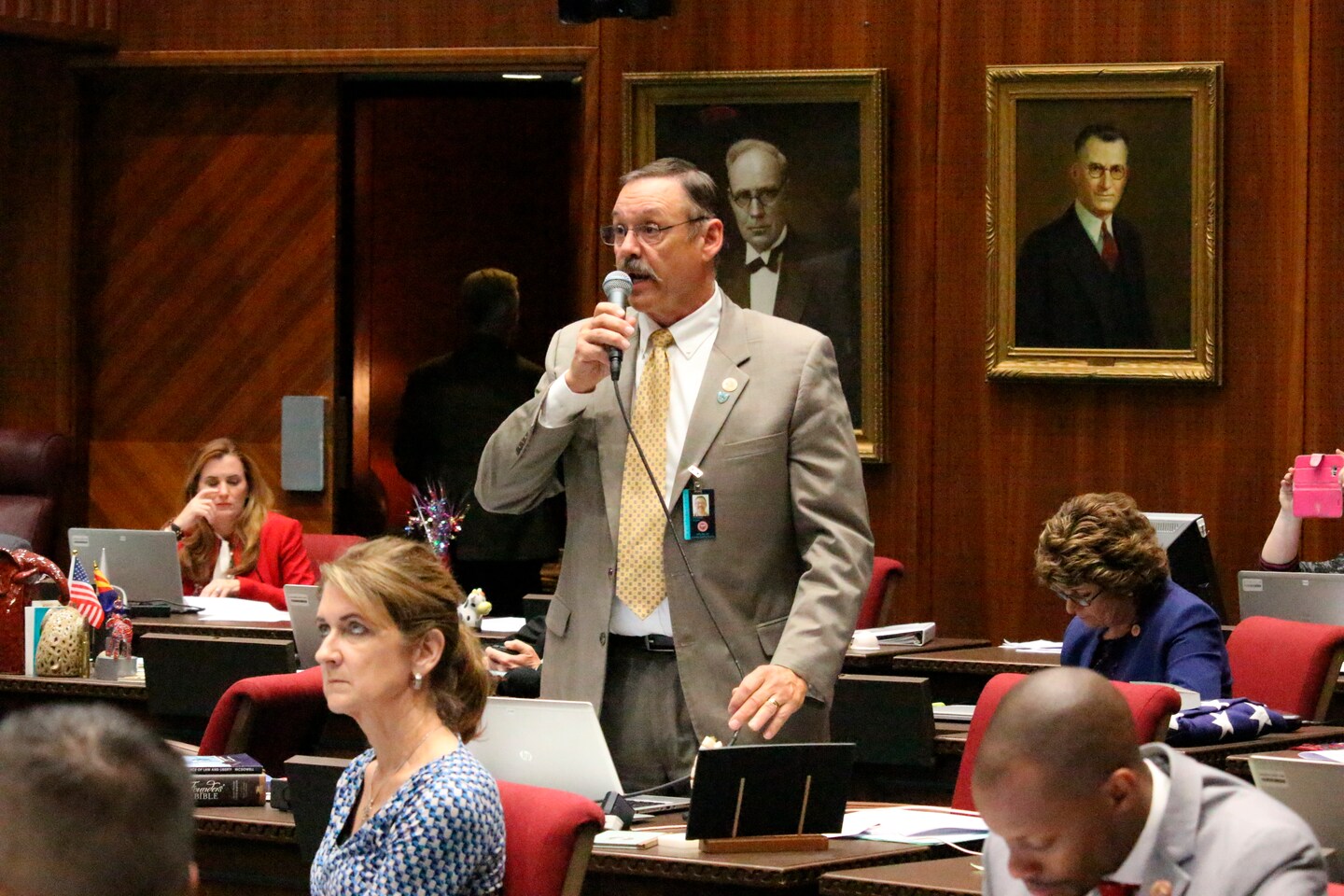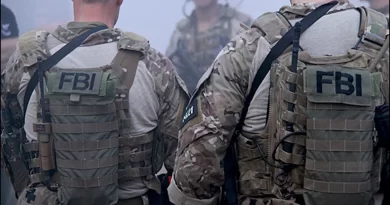Top election denier Mark Finchem aims to be Arizona’s top elections official

No matter how divergent from reality, the idea that Trump won the election two years ago is clearly not an outlier position on the right. To stand out as exceptional in embracing that position, then, takes something more. Not just expressing skepticism about the results but, say, actively working to undermine them. Continuing to press the case even as the “evidence” of fraud has collapsed. Maybe even committing to taking over a state’s elections system to rework it as you see fit.
To be truly exceptional in this space, then, you need to be someone like Arizona state Rep. Mark Finchem (R) — now one election away from taking over as that state’s top elections official next year.
On Thursday, Finchem participated in a brief debate with his Democratic opponent, Adrian Fontes. The discussion didn’t focus primarily on the dull mechanics of managing the state and operating its elections moving forward. Instead, it focused heavily on how Finchem had tried to unwind the last election. And Finchem was the first to raise the issue.
“I’m running for secretary of state to restore honor, to restore integrity, to restore security to the secretary of state’s office,” he began. He later claimed that the election results in some counties were “irredeemably compromised,” including Maricopa County, where Fontes had administered the 2020 vote.
His evidence? Well, he argued that Yuma County’s vote was tainted because of a case involving a former elected official who accepted and submitted other people’s ballots. This, he said, “altered the outcome of Yuma County” — apparently making assumptions about the scale of what occurred (the criminal charges centered on only four ballots) and failing to understand that this occurred in the 2020 primary.
Finchem claimed that they only learned about fraud after the vote was certified, meaning it was too late. But, of course, there is no evidence of fraud in Arizona, in Maricopa County in particular. There have been no arrests, or even credible allegations, of any rampant illegality; there has been no evidence presented showing undeniable flaws in the system. Nor has there ever been.
That latter qualifier is important because it overlaps with another point of debate on Thursday: Finchem’s presence at the U.S. Capitol on Jan. 6, 2021. Fontes, not unexpectedly, repeatedly noted that Finchem was present at the scene of the riot that day, though Finchem has insisted he didn’t know it was underway. (He would also later say he heard the riot was caused by antifa, which it wasn’t.) Asked about being there after the debate, he reiterated what he’d said in a statement at the time: He was “there to deliver an evidence package to Rep. Paul A. Gosar” (R-Ariz.).
It’s not clear what that “package” contained, but it’s not really important. Since that statement was first produced, there has been a lengthy, expensive, thoroughly partisan review of the vote in Maricopa County, home to about 60 percent of the Arizona votes cast in 2020. That review did not determine that Trump actually won — amazingly — but it did gin up a lot of new grist for the just-asking-questions mills. (The county very helpfully then answered those questions.)
Again, though, the point is that Finchem thought he had evidence of fraud then just as he thinks he has evidence now, but that evidence is as ethereal as a ghost. Yet Finchem purports to center those allegations in his decision-making anyway.
Last year, at the outset of his candidacy for secretary of state, Finchem sent out a remarkably frank fundraising email.
“I will protect the elections from the Steal,” it read, “and make sure that Arizona is the Red State it REALLY is!”
The phrase “the Steal” refers to the “Stop the Steal” movement, in which Finchem was an eager participant. He has been linked to Ali Alexander, the right-wing provocateur credited with ginning up the effort/money-making scheme in the wake of the 2020 vote. Finchem spoke at a “Stop the Steal” event in Arizona a month after the election, at which he pledged to prove that “the Steal” had occurred.
“Everybody seems to say, ‘We need to see the smoking gun, we need to see the bullets, we need to see the blood splatter … we need to see the full crime scene,’ ” he said then. “Ladies and gentlemen, that is exactly what we are doing.”
No crime scene, literal or metaphorical, was ever presented. In a recent interview with Time magazine, though, Finchem suggested that he already had all of the evidence he needed. Reporter Charlotte Alter asked him if he would certify a Biden win in 2024. She described his response:
“Finchem chuckled. ‘If the law is followed, and legitimate votes have been counted, and Joe Biden ends up being the winner,’ he told me, ‘I’m required under the law — if there’s no fraud — to certify the election.’ But, he added, ‘I think you’re proposing something that, quite frankly, is a fantasy.’ ”
“Why, I asked him, was it so impossible to believe Biden won in Arizona, as many polls predicted and postelection reviews confirmed? ‘It strains credibility,’ Finchem responded. ‘Isn’t it interesting that I can’t find anyone who will admit that they voted for Joe Biden?’ Was it possible that lots of people he didn’t personally know had voted for Biden? ‘In a fantasy world, anything’s possible,’ Finchem said.”
This is actually quite revealing. As I wrote in December 2020, that many Trump supporters knew few or no Biden supporters almost certainly contributed to the sense that Biden’s win was impossible. You heard one refrain regularly from those rejecting Biden’s victory: How could he have gotten 81 million votes? The answer, of course, was that a huge portion of those votes came in large, heavily Democratic cities — places that people like Mark Finchem often don’t live.
The important part of the quote, of course, is that Finchem told Alter that he’d certify a Biden win only in a “fantasy world.” And that’s the reason we’re talking about Finchem at all: He’s poised to have the power to decide whether the results of the election should be upheld.
If he had been similarly empowered in 2020, he would not have certified that election. In February, after months of adjudication and review of the votes in the state, Finchem called for the 2020 results in Maricopa, Pima and Yuma counties to be set aside. It’s not clear what practical effect that would have; Biden would still be president. But it’s worth noting that the purported justifications for this action were largely ones already debunked by Maricopa County.
The “evidence” was there just because Finchem and the others supporting the motion felt the need to make some sort of case. As is often the case, though, the evidence itself didn’t matter any more than it matters which route your car GPS serves up to you. They knew where they were going and didn’t care how they got there. If there was an unexpected roadblock, no problem. Just move around it. Find new “evidence.”
As secretary of state, Finchem could act both before and after an election to shape the outcome. He could limit voting mechanisms to benefit Republicans and he could approve audits or reviews to reach the same end. And he’s been explicit about the justification for doing so: He doesn’t think it’s possible for a Democrat to actually win in the state.
Vote for him, he promised, and he would “make sure that Arizona is the Red State it REALLY is”; that in federal elections in both 2018 and 2020 it wasn’t doesn’t matter. It’s about the destination, not the journey.
This article has been archived for your research. The original version from The Washington Post can be found here.


